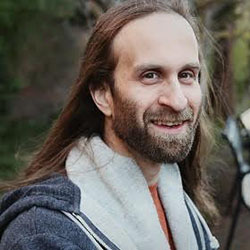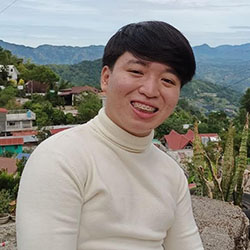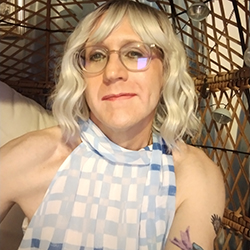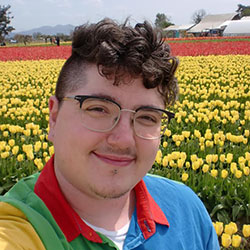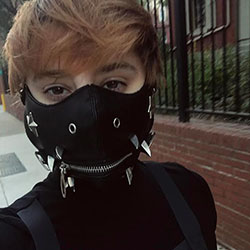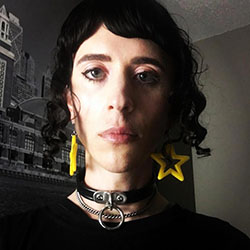What does being trans feel like? When cis people ask us what it is like to inhabit a body in transition, they are really asking a comparative question: what did it feel like before? And what does it feel like now? Both Hil Malatino’s Side Affects: On Being Trans and Feeling Bad, an academic work analyzing transition narratives beyond “exclusively curative” frameworks, and Gretchen Felker-Martin’s Manhunt, a satirical horror novel, respond wholly to this question. Whether through theory or fiction, both books defiantly stake out emotional territory at a time when anti-queer and anti-trans legislation are at an all-time high. In their celebration of transness and queerness, both Malatino and Felker-Martin tear, rip, and chew into oppressive cis-het norms.
In Side Affects, Hil Malatino analyzes transition narratives beyond the “exclusively curative and against the transphobic demonization of transition as unnatural, irreal, and inauthentic.” Malatino identifies emotions trans people cycle through, including future fatigue, numbness and withdrawal, envy, rage, and burnout; all of these emotions are amplified by systemic incompetence, individual, cultural, and political malfeasance, day-to-day micro-aggressions, and personal cognitive-emotional habits and states (Malatino’s necessary work on Trans Care is free to access here).
The main characters in Manhunt, navigate violent transphobia accelerated to extremes. This is a world split into two terrifying binary factions: fascist TERFS on one hand, and on the other, “T-Rex virus”-infected men mutated into beasts on the hunt for warm bodies to rape and kill. In this world, pregnancy is death, for the gestated rape baby matures quickly and eats its way out of the womb, and in weeks is a full-sized adult. The trans women heroines, Beth and Fran, must avoid TERFs while hunting men for their testicles and kidneys/adrenal glands, converting these trophies into estrogen in order to stay alive. Later, they must fight for autonomy with TERFs and bunker brats, privileged liberal cis women, within a climate of sexual desire and dehumanization. There are also men resisting this apocalypse, trans men, “out there, making their own manhood in the wreckage of the world.” Robbie, a trans man, comes to Fran and Beth’s rescue in a wonderfully queer inversion of the damsel in distress motif. Well-paced, fun, and bloody, what’s most intriguing is Felker-Martin’s rendering of queerness: In the future, being queer is the norm, for any hope of a heteronormative relationship is not possible; queerness is life.
Future Fatigue
Beth, Fran, and supporting character Feather express the varied realities of being transfeminine. Beth’s a “brick”, a non-passing trans woman, and is less confident and assured in her womanhood. She expresses what Malatino describes as future fatigue, disillusioned with the “bright sided promise of social ease, domestic comfort, and existential peace” unattainable in the apocalypse, reminding us that transitioning does not always equate to happiness. While recovering from wounds sustained from rape, Beth thinks to herself, “Fuck me, so I can pretend to be a girl,” as Fran and Robbie hook up beside her. Rejection by cis women turns out to be even more threatening than capture by infected men: Beth’s less worried about her genitalia than she is about being validated as a woman. After a sexual liaison with a cis woman, she concludes, “I’m a girl until a real one decides I’m not.” Fran, on the other hand, passes so well she makes Beth “feel delicate,” a fem’s fem, so to speak, and Fran also experiences future fatigue, centered around bottom dysphoria. When the bunker brats certify her ID card with an F, for female, her heart leaps “in joy and terror…I’m going to be a real woman here. I’m going to be real.” Along the way, she is promised vaginoplasty if she tags along into TERF territory. In Manhunt, the boundaries of “acceptable” gender are both life-and-death and infinitely mutable. Feather, a non-binary transfem sex worker who, after an orchiotomy, becomes desirable for TERF chasers seeking “safe” cock. In the TERF community, there are Maenads, re-educated trans women forced to have orchiectomies and serve the matriarchy, a cruel twist on transitioning and female domination kink. Beth and Fran both fear becoming Maenads, an additional shadow of future doom that they experience. Robbie suffers from future fatigue as well, one that is weighted by the fact that hormonal transition for transmascs is not possible in the world of Manhunt: testosterone equates to death.
Numbness and Withdrawal
Numbness and withdrawal, envy, rage, and burnout constitute the negative emotional spectrum of experiences in the world of Manhunt. In the apocalypse, numbness is a necessity to withstand familiar stressors of living, exacerbated by scarcity and fear. Certainly, Beth, Fran, Robbie, and supporting characters seek numbness throughout the novel. Weed is grown throughout the Commonwealth of Massachusetts wastelands, and the bunker brats have designer drugs. Everyone drinks, TERFs exuberantly so. In the real world, Malatino argues, numbness and forms of social, cognitive, and emotional withdrawal are natural coping mechanisms for dealing with disorientation, the emotion trans individuals are likely most intimate with, the emotional state arising out of experiences where we are acutely aware how our existence is dissonant with the mundanity we interact with. These include experiences in which we “are referred to by the wrong name, the wrong pronoun, the wrong honorific; the moments wherein we are touched in ways that trigger rage, sadness, dysphoria, self-hatred, self-harm, where our bodies are being interacted with as if they were something other than how we understand and inhabit them.” Hostile reactions and cognitive biases towards trans individuals combine with cultural forces to deny, gatekeep, and reject us. Disorientation is a default emotional setting, one that can create a flat affect response, a social, cognitive-emotional withdrawal from interactions. Who likes negative feelings? Felker-Martin’s characters retreat from disorientation just as we do in our own personal day-to-day struggles of being trans, but in Manhunt, the avenues to escape disorientation are limited.
One of the ways in which Felker-Martin’s future evokes hope is through the queer/t4t relationships that allow for the heroes to experience an affirming intercorporeality, a social construct created when people intermingle, usually driven by norms that trans individuals upset. In Manhunt, as in life, the co-constitution of trans bodies and their environments is a swinging door between acceptance and transphobia. The queer intersectional communities of Manhunt welcome and affirm trans women, the TERFS do not. When murderous rapist men and TERFs dominate the landscape, both physical and emotional, withdrawal and numbness become a balm. Numbness is slippery, necessary, and dangerous, depending on your disposition and privilege. Robbie’s narrative arc arises out of withdrawal and numbness. It is only with the help of other trans and queer individuals that Robbie re-emerges from fear and isolation. At first, “Robbie wanted to run…” fearing that no one would want him. “I’m a courtesy tacked onto a courtesy,” he thinks, rather than a desired part of any community. But Fran’s love and affirmation, and his friendship with the others, help reshape Robbie, repeating Felker-Martin’s most powerful assertion, queer communities are necessary to not only survive, but thrive.
Envy
Malatino’s work aptly showcases envy as a cultural and sociopolitical weapon against gender-nonconforming people, “because the desire to transition has been so frequently diminished and dismissed as a kind of envy…to pursue transition is, within this understanding, to double down and community to one’s envy, rather than recognizing it as pernicious and doing one’s best to quash it.”
Envy, viewed as a sin, is especially useful in a theocratic society to suppress dissent against gender norms; consider how envy is most often utilized as a “term describing a subject who lacks rather than a point of insight into social inequality.” In Manhunt, Beth, Fran, and Robbie express gender/bodily envy as major drivers of the plot. Beth wishes she wasn’t so bricky, Fran’s bottom dysphoria dominates her motivations, and Robbie can not fully medically transition without becoming a beast. It is through Robbie’s character that the weight of envy feels the most detrimental, the most toxic. Robbie pleads with the universe to “please make [him] a man”, a desperate position, one that defines his character. Fran’s quest to become a “real woman” through surgery impacts the narrative on several levels, while also providing contrast to Beth’s experience. In many ways, this emotional register dominates, for the apocalypse does not provide the surgical or medical options for the kind of transness cishet culture assumes is the only way to happiness and acceptance. Felker-Martin and Malatino see this imagined, normative future and push back.
Rage and Burnout
Anger at the system, personal attacks, and the cognitive and emotional overload of simply existing and caring is a ubiquitous feeling among trans and queer communities. However, Malatino also describes anger as an “orienting” emotion, a gesture that draws on intersectional feminist movements of the past.
In “The Uses of Anger,” Audre Lorde describes how anger becomes a catalyst for change, how rage becomes the engine. Malatino’s work echoes this sentiment, exploring the nuances of anger in trans lives noting how often “we break to keep on living” as our lives are “engulfed by sad passions, when living among entities intent on minimizing our capacities.” Rage can also lead to burnout as it was originally coined in free clinics for people gave of themselves to care for others in the community, “labor” that is unpaid and demanding.
Because there are few safe spaces for the trans characters of Manhunt, the heroes’ dependence upon each other becomes a strength. Certainly, the characters are exhausted by rage, scarcity, and fascism, which in Felker-Martin’s capable hands become genesis points for moments of joy with and for each other. Tucked away in the bunker brats’ Screw, Fran marvels how she “will never be hungry again” and how “it felt good to cook” while “Beth was teaching Robbie how to play Screw, both of them slamming cards down on the coffee table and slapping each other’s hands.” They play “Never Have I Ever,” briefly finding stability and positive intercorporeality among cis female neighbors before Felker-Martin yanks the rug out from under them, again. Like Side Affects, Manhunt illustrates that community, friendship, and love are therapeutic, tenuous, necessary labors to counter systemic violence.
Obviously, Felker-Martin’s characters employ violence to counter violence given the characters’ limited privilege in the new world, violence is an appropriate response, but not the only response. Passion, sex, and romance also become tools to fight Manhunt’s oppressive authorities. The eroticism of Manhunt is body positive, queer, and intense; sex both healing and traumatic drives characters forward. They run counter to the T-Rex virus’s weaponization of sex and reproduction, as well as the colonized cisnormative ideas of sex and desire that the TERFs propagate. One of the recurring motifs that illustrates the care and compassion between the characters is how Indi, Beth’s sometimes-lover and doctor, kisses and caresses Beth’s scar, a dysphoric feature for Beth, one that becomes a flashpoint for her emotional well-being when she is forced to wear a binder and perform as a sex worker for the bunker brats. “This is just a job,” Beth rationalizes, as her “soul comes back into her body” running her fingers across the scar thinking “It doesn’t mean I’m fake,” a conscription that re-traumatizes her and aggravates her body dysmorphia.
Malatino’s Side Affects explores and reveals nuances of trans experience, pushing back against both cis (and trans) narratives of happiness and being, arguing that it is only through “collective processing that we’ll be most able to approximate anything close to radical transformation, anything that remotely resembles healing”. Those “bad” feelings trans individuals experience and share can be viewed as a compass, we can choose which direction to follow, directions that are sure to deviate from a straight line. People, after all, are complex organisms interacting with systemic, cultural, societal, and interpersonal forces, but “bad” feelings can be powerful tools for reorienting, healing, and change. In light of this, Manhunt is a bloody love poem to transness, reflecting the emotional realities of trans people across the planet. What does being trans feel like? Manhunt replies that it feels like every man wants to either fuck you, murder you, or both. It feels like TERFS are sitting behind an armored vehicle coming for your neck. It feels “bad”, it often feels like you are not understood, not validated, or sexualized and depersonalized by cishet people, institutions, and organizations, yet among like-minded people, it’s joyous, fulfilling, and wonderful. Felker-Martin’s novel is a double-edged blade, balanced between fun catharsis and realism. Manhunt refuses the “cruel optimism” of a progressive pro-trans future as the age of scarcity begins; Felker-Martin’s world is one where only through trans solidarity can one find the love and support one needs to survive and thrive in a world of pain, one where each choice is a fight for life. Beyond satire, social commentary, and gleefully tense action, Gretchen Felker-Martin’s Manhunt celebrates the adaptive ways queer people survive, love, live, and fuck, a book about the future, but one firmly rooted in the now.
Manhunt, by Gretchen Felker-Martin
$17.99, Nightfire Books, Tom Doherty Associates
Side Affects: On Being Trans and Feeling Bad, by Hil Malatino
$21.95, University of Minnesota Press
Cassandra Whitaker (they/them) is a trans writer from Virginia. Their work has been published in or is forthcoming in Barrelhouse, Hobart, The Little Patuxent Review, Foglifter, Evergreen Review, The Comstock Review, The Rumpus, and other places. They are a member of the National Book Critics Circle.






